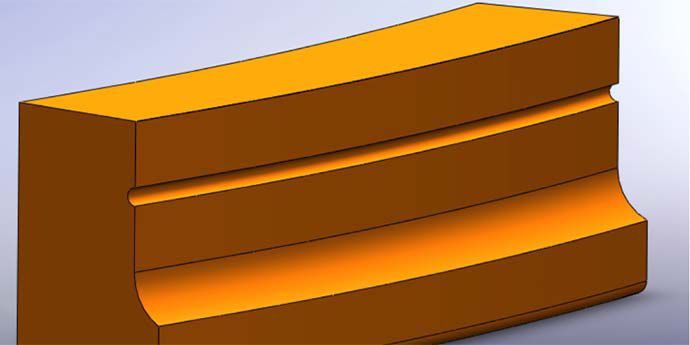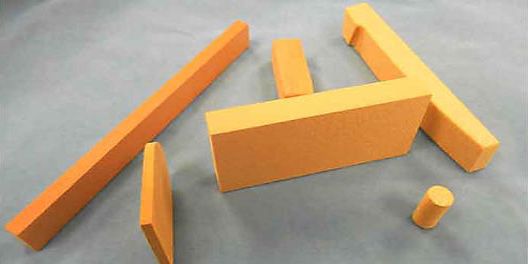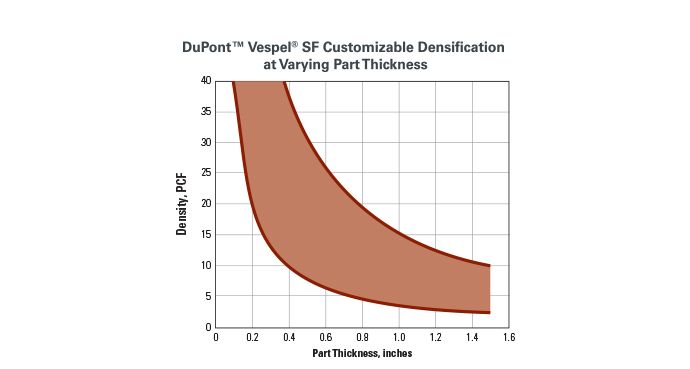Vespel® SF Foam Products Offer Performance at Extreme Temperatures
Fallstudie

Figure 1.
Vespel® SF foam products are unique in their high-temperature capabilities. They offer excellent thermal, electrical, and acoustic insulation properties in a variety of potential applications, from stator vane seals and nacelle insulation to abradable seals and reinforced composite panels. The low density of Vespel® SF foam products provides weight savings that can be customized to meet customer requirements.

Figure 2.
Applications
Vespel® SF custom parts are ideal candidates for aerospace applications in which temperature resistance, weight, dampening, and sealing are of concern. Due to the unique properties of Vespel® SF, it has been used in the aerospace industry to solve an array of problems including specific applications in stator vane seals, variable bushing packing, nacelle insulation, abradable seals, and reinforced composite panels.
Challenges
- Isolating systems of varying pressures
- Insulation from temperature variations
- Environments where operating temperatures can exceed 300°C (572°F)
- Weight reduction
- Acoustic and dampening isolation
- Provide light weight structural stability
- Seals/coating systems that are easily maintained in the field, thus extending MTBR and reducing cost
Solution
- Vespel® SF is a unique open-cell high performance custom densified polyimide foam which has been produced at varying densities ranging from approximately 0.16–0.56 g/cc (10–35 lb/ft3) to suit the most demanding aerospace applications. (Figure 4)
- Customizable Vespel® SF densification allows for “tailoring” of mechanical properties to meet appropriate structural application needs. (Figure 3) Three standard grades (SF-0920, SP-0930, SF-0940) are available with respective datasheets.
- Vespel® SF can be pre-formed and machined into complex geometries to suit varying customer requirements. (Figures 1 and 2)
- Vespel® SF is a durable material with a high degree of chemical stability as well as thermal and acoustic insulation.
- Vespel® SF offers high temperature continuous use at 300°C (572°F) with the added benefits of being flame resistant as well as safe to handle when exposed to open flames with no off gas or release of toxic fumes.
- Vespel® SF can be easily bonded to various mating surfaces thus making them suitable for field repairs.

Features and Benefits
- Sealing properties
Vespel® SF seals offer a unique balance of properties including durability, high temperature resistance, low CTE, abradable properties, and low weight (PCF) without compromising structural integrity making it a material of choice when it comes to sealing applications. - Tensile strength
Ultimate tensile strength varying from approximately 425 to over 26,000 kPa (61–3,700 psi) depending on the design density. - Safety and environmental stewardship
Fire resistant by design, Vespel® SF polyimide foam emits virtually no off gas and does not release toxic fumes when exposed to open flames. Its non-fibrous composition promotes safe handling during processing and final assembly. - Design flexibility
Vespel® SF can be molded and machined to match unique geometries of both common and complex designs. Parts can be easily bonded at initial assembly or in the field. (Figures 1 and 2) - Improves efficiency by reducing fuel consumption and increasing payload capacity
Vespel® SF polyimide foam can be manufactured to meet density requirements in the range of approximately 0.16–0.56 g/cc (10–35 lb/ft3). - Solving a variety of problems
From abradable seals, stator vane seals, variable bushing packing, and nacelle insulation to composite paneling in structural applications, the versatility and durability of Vespel® SF products allows you to think out of the box to solve an array of problems where temperature resistance, weight, dampening, or sealing are of concern.
